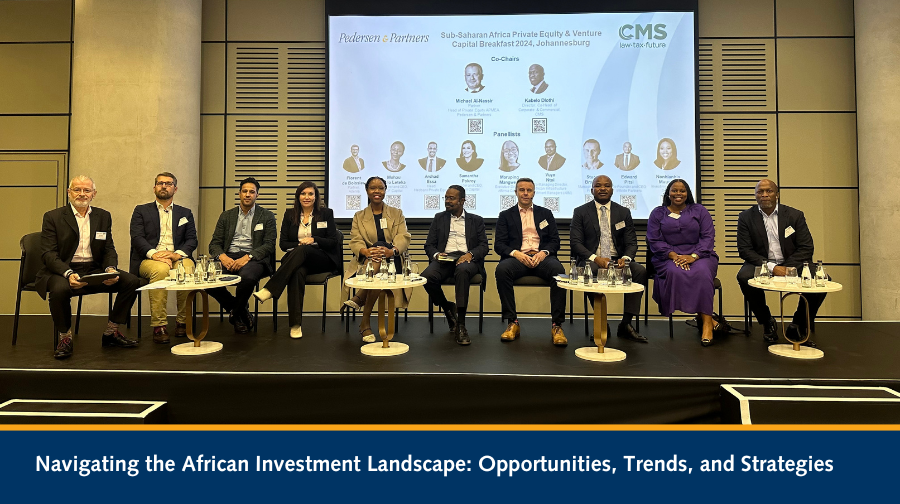Private Equity in Africa: Key Takeaways from the Johannesburg Panel Discussion
August 13th, 2024, Johannesburg
Executive Summary
The key takeaway points summarise the key insights from a recent panel discussion on private equity in Africa, held in Johannesburg. The discussion highlighted several critical areas, including exits, fundraising, regulatory approvals, value creation, ESG/DEI, and talent development. As the African private equity landscape evolves, investors are increasingly focused on flexibility, strategic partnerships, and impact investing. This summary outlines the opportunities and challenges that shape the future of private equity in Africa.
Introduction
Private equity (PE) in Africa is gaining traction as investors recognize the continent’s potential for high returns and growth. However, navigating this landscape requires a nuanced understanding of local markets, regulatory environments, and socio-economic factors. The Johannesburg panel discussion brought together industry leaders to explore these dynamics and share insights on achieving success in African private equity.
Overview of Private Equity in Africa
Africa’s private equity market has experienced significant growth, driven by an increasing number of deals, a rise in investment opportunities, and a focus on impact investing. Key markets include South Africa, Nigeria, Kenya, and Egypt, with sectors such as technology, healthcare, and consumer goods attracting the most interest. Despite the opportunities, challenges remain, including regulatory complexities, political instability, and a scarcity of experienced talent.
Key takeaways from the event:
Exits
- Preferred Exit Strategies: While sales to management are less favored, trade sales and strategic exits are more common. Recapitalizations have become prevalent due to assets held for over seven years.
- Buyer Synergies: Identifying synergies with potential buyers is crucial. Investors should collaborate with those lacking a platform in Africa to understand their needs.
- Strong Management Teams: A robust management team is vital for successful exits, as is educating buyers on local market conditions.
- Successful Secondaries: There have been notable successes in secondary sales, particularly in smaller deals that are easier to execute.
- Quality over Scale: While scale matters, the quality of the business is paramount. Investors should focus on enhancing the intrinsic value of their assets.
Fundraising
- Challenging Market Cycle: Despite challenges, fundraising is achievable with a strong track record and positive LP relationships.
- Role of DFIs: Development finance institutions (DFIs) play a significant role, accounting for approximately 80% of funding. Their sector-focused teams improve GP interactions.
- African Pension Funds: African pension funds are increasingly interested in PE, emphasizing the need for investments that benefit local communities.
- Tailored Fundraising: Customizing pitches to the audience and maintaining transparency with LPs are essential strategies.
- Co-Investment Opportunities: Offering co-investment opportunities to LPs has proven beneficial. Another strategy involves raising funds around a key asset.
Regulatory Approvals
- Changing Regulatory Environment: Investors must stay informed about shifting regulatory landscapes affected by economic and technological forces.
Value Creation
- Control and Alignment: Achieving value creation requires alignment with management and proactive decision-making.
- Impactful Investments: Investors should consider the impact they can bring to businesses, including empowering leadership teams and retaining talent through ESOPs.
- Courageous Conversations: Open dialogues and alignment with management should occur early in the investment process.
ESG/DEI
- Diversity and Inclusion: GPs have made progress in improving gender balance and diversity. ESG considerations have evolved from mere box-ticking to a practical, common-sense approach.
Talent
- Succession Challenges: Succession planning remains a challenge, and talent in the African PE/VC community is scarce.
- Empowering Junior Team Members: A successful strategy involves empowering junior team members, trusting them, and providing opportunities for growth.
Panelists:
- Florent de Boissieu – Partner, Adenia
- Stuart Bradley – Managing Partner, Phatisa
- Arshad Essa – Head, Nedbank Private Equity
- Maruping Mangwedi – Executive Director, Affirma Capital
- Nonhlanhla Mvuyana – Investment Manager, Sithega
- Vuyo Ntoi – Co-Managing Director, African Infrastructure Investment Managers (AIIM)
- Edward Pitsi – Co-Founder and CEO, Infinite Partners
- Samantha Pokroy – Founder and CEO, Sanari Capital
The panel discussion was co-chaired by Kabelo Dlothi – Director, Co-Head of Corporate & Commercial, CMS and Michael Al-Nassir – Partner, Head of Private Equity Practice APMEA, Pedersen & Partners.

